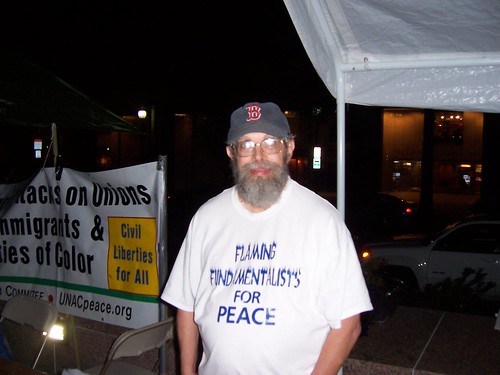 Curt Day was one of the occupiers of Freedom Plaza in Washington D.C. the Columbus Free Press spoke with on Friday Oct 7. He said activists on the left who want to build a mass movement have to get outside our comfort zones and directly help people with their needs, whether it pertains to housing, medicine, food, transportation, or education.
Curt Day was one of the occupiers of Freedom Plaza in Washington D.C. the Columbus Free Press spoke with on Friday Oct 7. He said activists on the left who want to build a mass movement have to get outside our comfort zones and directly help people with their needs, whether it pertains to housing, medicine, food, transportation, or education.
He said the political left has neglected community involvement on an individual basis and on a group basis.
“If you look at the Black Panthers in the 60s and 70s, they were doing things that served the community. They were feeding the children. They were opening medical clinics. You couldn’t have a Black Panther chapter without doing one of those two things.”
Day said many groups of the political left focus on protesting or having meetings without really helping communities in need.
“That’s one of the problems we have as leftists. It comes down to some simple things. We (on the political left) are not willing to be uncomfortable and don’t care enough about enough people( to be successful at building a movement). If we did, we’d have more community support.”
He alluded to an observation of Rachel Corey who was killed in 2003 at the age of 24 as she tried to prevent Israeli soldiers from bulldozing the home of a Palestinian pharmacist.
“On page 15 of her journals it says, ‘we love the poor when we’re warm and snug and they’re far away but when we’re up close and we see the whole affects of what poverty does to them--we can smell their breath and look into their eyes---we shrink away.’”
Whether it has to do with forming face to face ties with people different from us or otherwise pushing ourselves beyond our comfort zones, Day said if we do that, others may follow suit. He is a self-described fundamentalist Christian. But during the past few years he has become a leftist.
“What changed me is that my best friend who was outside my circle of faith showed more compassion to people and even to animals than I anyone in my faith did. That brought some dissonance.”
Day said that caused him to read writings that were not condoned or recommended in his circle of religious faith, such as those by Martin Luther King Jr. and Noam Chomsky.
“King had a passion for winning people over and Chomsky has a passion for fairness. These are biblical ideas but no one on my side (at the time) was willing to look at it because they only wanted to stay in their circle with the people they were comfortable listening to.”
Day said that sort of close-mindedness---which can exist whether a person is on the political left or political right---is linked to self-righteousness.
“That self-righteousness, that sense of superiority is a weakness in any movement--right, center, or left. The moment we think we’re righteous and above others, we’ve lost.”
Some people have said building a mass movement requires spirituality. But Day said caring about others is what is vital, not spirituality, per se.
“Like I said already, the audience might not be ready. There are a lot of things tugging at them that say, ‘Stay here. Don’t rock the boat. As much as the boat looks like it might be sinking, still don‘t rock it.’ Even though the audience might not be ready, we just have to give it our best shot with demonstrations and with being involved in the community, and with individual-to- individual kindness. The more we can do that, the more we can increase the odds (of building a movement that makes the world a better place). But there’s no guarantee…You give it your best shot, not because there’s a guarantee of victory, but because your compassion for others makes you do it.”
